We’re up to the San Jose Sharks coaching staff in our review of the 2017-18 season. The prior articles are here:
- Main Points
- Forwards
- Joe Thornton
- Defensemen
- Goalies
- Roster and Salary Cap
- Coach
- GM and Owner (up next)
When it comes to San Jose Sharks head coach Peter DeBoer, it’s never simple. By any objective measure, DeBoer has taken this team at least as far as it should have gone in each of his three seasons as San Jose’s bench boss.
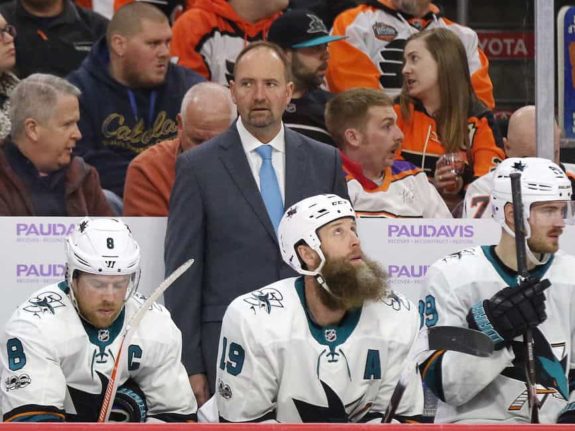
In his first season, the Sharks crushed expectations and went to the Stanley Cup Final. In his second season, the Sharks made the playoffs, but were riddled with injuries and fell in the opening round. This season, DeBoer’s third, the Sharks made a second round playoff exit, playing a very competitive series against a very good team with a goaltender playing in another world.
Under DeBoer, it is hard to say the Sharks could have gone any further than they did. And yet, with DeBoer, you still get the uneasy sense something is left on the table.
DeBoer, High Expectations and Buts
In the Stanley Cup final against the Pittsburgh Penguins in 2016, people wondered if the slow defensive pairing of Roman Polak and Brenden Dillon might be exploited by the speed of the Pens. Against heavier teams on the way to the Final, the pairing fared well. But the risk going into the Final was apparent. If it was not obvious before the series started, it was obvious shortly thereafter. DeBoer stood fast instead of inserting a more mobile defenseman. The pair DeBoer went with was heavily exploited by Pittsburgh, many citing it as one of the keys to the Penguins series victory.
In the 2016-17 season, there was reason to believe the Sharks might wear down. The short offseason, the impact of the World Cup of Hockey, the condensed schedule and an aging roster all said there’d be risk in overplaying the top players. The team, in DeBoer’s words “ran out of gas in March.” But the risks were obvious before the season started and it is the coach’s job to make sure the team doesn’t run out of gas.
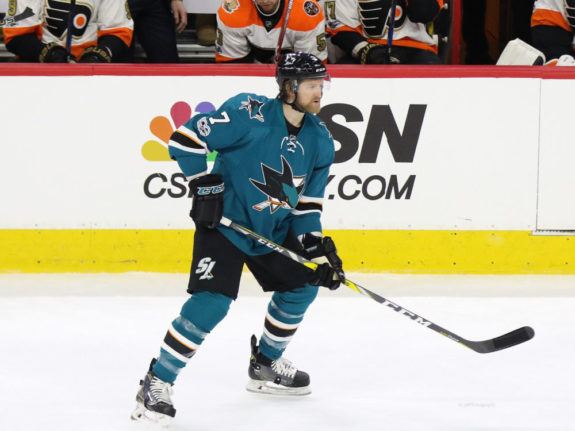
This season, people questioned whether DeBoer might want to return the more agile Joakim Ryan to the defensive group replacing Paul Martin for the playoff series against the Vegas Golden Knights. Vegas, a team which strongly resembles the 2015-16 Penguins, presents a big challenge for less mobile defensemen. DeBoer said he’d “be an idiot” to make lineup changes. But in Game 2, a double-overtime affair, Martin only played 10 minutes while his defensive partner, Brent Burns, played 37. Clearly DeBoer didn’t trust Martin, yet he turned to him again for Game 3. During a Vegas rush up the ice in overtime of Game 3, Martin made a fateful choice. He attempted to switch coverages with Burns, but it didn’t work. A moment later, Vegas fired home the game-winning goal. The next game, Ryan was inserted into the lineup.
In each season and despite solid overall results, DeBoer left himself open to legitimate second guessing.
The Year of Peter DeBoer
At the start of this season, we posed three major questions for this team. One concerned Joe Thornton, one concerned general manager Doug Wilson’s use of cap space and one concerned DeBoer: Is Peter DeBoer the right coach for this team?
The question about DeBoer had a bunch of pieces to it. And he answered almost every piece in a good way.
DeBoer gets particularly high marks for the growth of younger players on his roster. While he doesn’t deserve sole credit, the fact so many advances happened under his watch is impressive. Among those who took significant steps are Chris Tierney, Marcus Sorensen, Timo Meier, Joakim Ryan, Barclay Goodrow, Dylan DeMelo and Tomas Hertl.
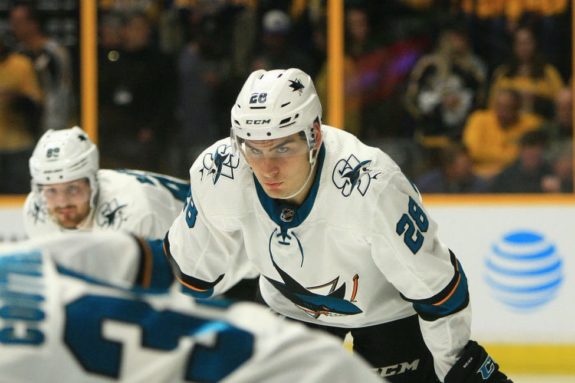
Further, DeBoer gets some credit for getting improvement from both his Danish forwards, Mikkel Boedker and Jannik Hansen. Hansen’s play late in the season was strong, but the roster depth left him on the shelf for the playoffs. Boedker, who struggled last season, also struggled in the 2017 part of this season. In 2018, though, Boedker hit stride and became the weapon he was slated to become.
Sharks Situational Improvements
DeBoer’s team improved on both special teams. Last season, the Sharks only tallied 41 times on the power play, giving up six short-handed goals for a net of plus-35. This season, the improvement was dramatic; 53 scores and only three shorties resulted in a plus-50.
The penalty kill improved as well. Last season, the Sharks net deficit was 34 goals on the penalty kill, allowing 41 but scoring seven short-handed. Overall, good enough to tie for seventh best. This year, they gave up only 34 scores and netted eight shorties for a net of minus-26, making their penalty kill the best in the league.
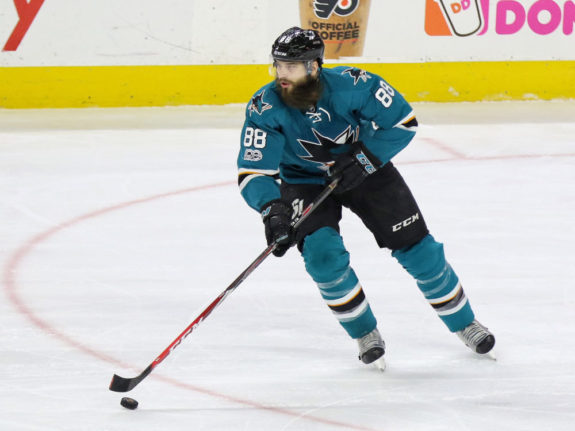
In total, the Sharks were plus-1 on special teams last season which is middle of the pack. This season’s plus-24 is best in the league.
One area San Jose needed improvement was in the face-off circle. Last season, the Sharks were below 50% in the face-off circle for the first time in over a decade. This season, they were back in positive figures, winning 51.2%, good for ninth overall, up from 23rd last season.
DeBoer’s Major Miss
One of the questions about DeBoer for this season is what he’d get from Burns. Burns delivered a Norris Trophy winning season in 2016-17. The award is for a full year and for 66 games, Burns was the best player in hockey. But in the final part of last season, he struggled. The question was which Burns would we get in 2017-18, especially with the departure of assistant coach Bob Boughner. Boughner was credited with helping Burns improve his all around game. San Jose added Rob Zettler to the staff, replacing Boughner.
Alas, San Jose got the problematic Burns. At one point, Burns hit an abysmal minus-24. Though a late season improvement led to a finish of minus-16, it was still by far the worst on the team.
Burns is the Sharks most expensive player. He has both the longest and largest contract in team history. The rest of the Sharks defensemen, with the exception of Dillon (minus-7) were either close to even (DeMelo, Martin, Heed) or decidedly positive (Vlasic, Braun, Ryan). The highest paid player, the guy paid to takeover games, can’t be the lowest rated player. For all the good done by the coaches did, fixing Burns (again) is a priority for DeBoer and his staff.
DeBoer’s Clever Moves
DeBoer deserves credit for some specific moves made over the course of the season.
The coaches revamped the power play early in the season and it delivered remarkable results (25 goals in 25 games) right up until Joe Thornton was injured.
Later in the season, he decided to regularly double shift Burns on the power play, an interesting move which didn’t pay much in the way of dividends, but is one I’d like to see explored in the future. It might be worth exploring this with Thornton, too. Both are players are more valuable on the power play than at even strength. I’d gladly trade a bunch of their even strength minutes for more time on the power play.
When Thornton went down, DeBoer often used Kevin Labanc on the top power play unit. Labanc was an inspired call. He isn’t an offensive force at even strength, but with the open ice accorded to the power play, Labanc proved a valuable addition.
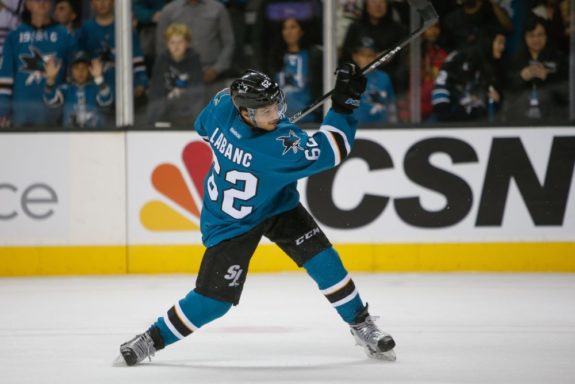
In late January, goalie Martin Jones returned to the Sharks lineup following an injury. His return game wasn’t very good, but DeBoer decided to put Jones in the next night. It’s rare to see a goalie start on consecutive nights, but Jones did. The second appearance seemed to help Jones find his groove and led to a stellar month of February.
In April, for the start of the playoffs, DeBoer inserted Marcus Sorensen into the lineup. Sorensen had a very modest season, with just two goals, seven points and a minus-5 rating over 32 games. But DeBoer saw something in Sorensen late in the season and he was right. Sorensen netted four goals, five points and was plus-5 in ten playoff games.
For DeBoer; Steps Forward, Steps Back
For every move DeBoer made, there often seemed to be a corresponding move he needed to make but didn’t.
Yes, he helped Jones get back on track, but he also overplayed Jones down the stretch and Jones finished the regular season on a down note as a result.
Yes, he double-shifted Burns on the power play, but he also relied on Burns to quarterback the unit and it’s not really a good fit.
Yes the power play was rebuilt, but it needed a second rebuilding once Thornton went down. Instead, the power play spent a long time in purgatory. Yes, it was a good call to promote Labanc over other more obvious candidates to the top power play unit. But the coaches didn’t re-optimize the unit and it struggled the rest of the way. Some will cite the playoff result of 11 goals with a 23 percent rating as evidence of an improvement for the playoffs, but four of the power play scores were the final four tallies in an 8-1 win over Anaheim. Take away the padded the stats and the playoff power play was merely OK.
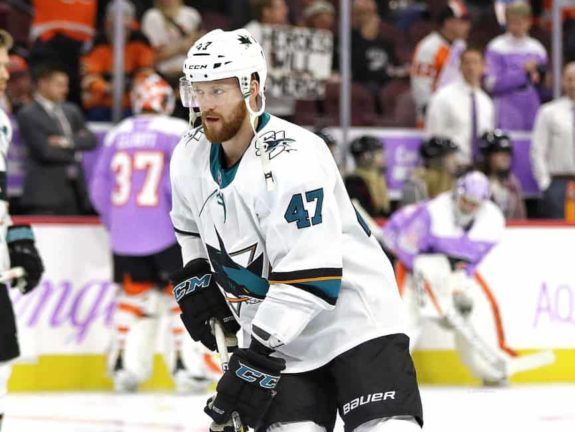
Two player combinations worked extremely well in the AHL last season and DeBoer had the chance to try them in the NHL this season. Center Ryan Carpenter and winger Barclay Goodrow had tremendous chemistry together for the San Jose Barracuda. So did defensive partners Tim Heed and Joakim Ryan. Hockey relies on chemistry between players and these combinations had it. There were plenty of chances for DeBoer to see if their chemistry from the AHL ported over to the NHL. Yet overwhelmingly, DeBoer kept these players apart.
Ultimately, DeBoer felt he couldn’t make it work with Carpenter, who had just one assist in 16 games before being waived. Vegas picked him up and he’s now an every game player for them. In 49 games for Vegas (and counting), Carpenter has put up nine goals, ten assists and holds a plus-6 rating. The whole Sharks team got to shake Carpenter’s hand at the end of the playoff series when Vegas ended San Jose’s season.
DeBoer did a nice job with the decision to put Evander Kane of Joe Pavelski’s line, the chemistry was excellent. But Kane, nursing at least one injury and perhaps two at the time, pushed his way back into the lineup for the final regular season game. It might have been wise for DeBoer to let Kane continue to recover. By the Vegas series, Kane’s injuries rendered him much less effective than San Jose needed. The risk in playing Kane in the season finale was significant, the potential reward was not.
It isn’t clear any of these smaller decisions fundamentally changed the Sharks season, but each one is a head-scratcher. And it is possible, given the closeness of the playoff series against Vegas, a small thing might have made the difference between playoff success and an early offseason.
DeBoer’s Bottom Line Results
This was a pivotal year for DeBoer, with many issues facing him and his staff. The Sharks made a number of major improvements this season and DeBoer, along with his staff, deserve plenty of credit.
Taken season by season, it’s hard to argue with DeBoer’s bottom line results. Still, it’s easy to argue, season by season, DeBoer’s missed something really important and really obvious – to the team’s detriment.
DeBoer has done much good in San Jose, checking almost every positive box. But the missed checkmarks always seem to haunt the Sharks. The misses weren’t bad luck or nitpicks; they were issues many others saw ahead of time and they proved critical. This is the conundrum surrounding DeBoer.
There is no conundrum for general manager Doug Wilson regarding DeBoer. He stated DeBoer, along with the rest of the coaching staff will be returning for next season.